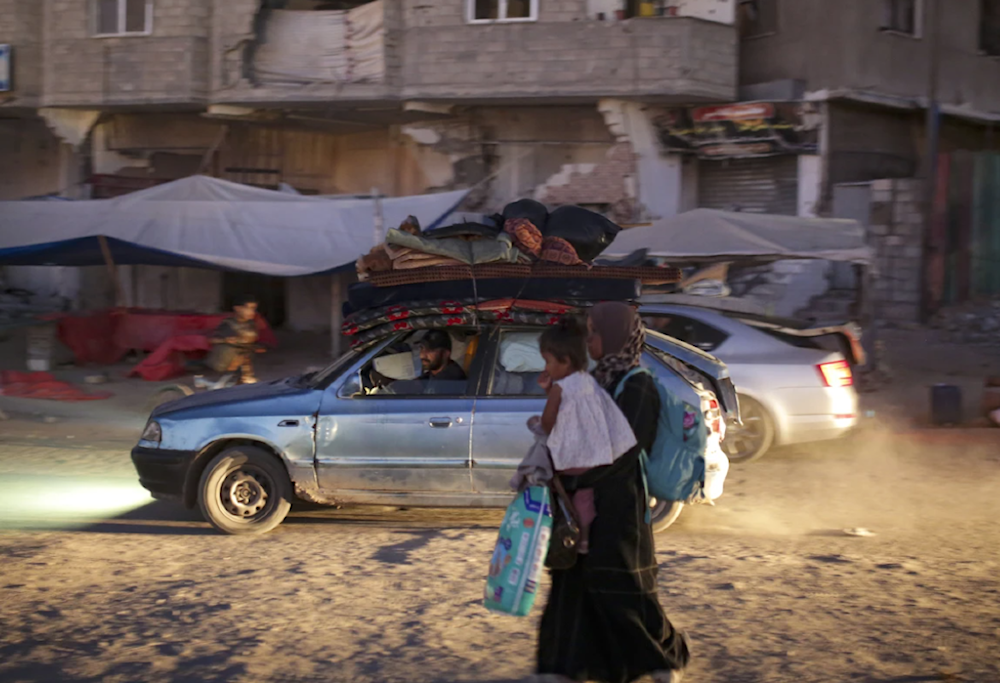Gaza clans refuse to join Israeli plan for post-war Gaza: Reuters
Reuters spoke to Michael Milshtein, a former colonel in Israeli military intelligence, and he confirmed that "There is no vacuum in Gaza, Hamas is still the prominent power."
-

Palestinians displaced by the Israeli air and ground offensive on the Gaza Strip flee from parts of Khan Younis following an evacuation order by the IOF to leave the eastern part of the Strip on July 1, 2024(AP)
According to Reuters, clan leaders in Gaza refuse to participate in the Israeli plot to manage the Strip after the war, which is based on "cooperation with powerful local families," as described by Israeli officials.
Israeli occupation officials are trying to chart a course for the day after the war, while the United States is seeking to find a role for the Palestinian Authority to play in the Gaza Strip.
According to public declarations from senior Israeli officials, a key component of the strategy was to create an alternative civil administration including local Palestinian players who were not part of the current power structures and were eager to collaborate with "Israel."
Reuters spoke to Michael Milshtein, a former colonel in Israeli military intelligence, and he confirmed that "There is no vacuum in Gaza, Hamas is still the prominent power."
Tahani Mustafa, Senior Palestine Analyst at the International Crisis Group, told the publication that while "Israel" has been desperate to seek local clans and families to cooperate with them, those families and clans have refused.
Speaking to some members of those families, Reuters was told that none want to cooperate. In one case a clan leader expressed he was aware of Israelis contacting other clan heads, citing they wanted some "respected and influential people" to cooperate, citing that he expects none to "cooperate with these games."
Another senior member of a different clan told Reuters that though his clan was not yet contacted, "Israel" would not be welcome if they reached out, citing "We are not collaborators. Israel should stop these games."
Netanyahu reconsiders PA for 'day after' in Gaza Strip management
Israeli Prime Minister Benjamin Netanyahu's office has been reconsidering its stance on involving the Palestinian Authority in managing the Gaza Strip in the "day after", according to The Times of Israel.
Initially opposed, Netanyahu now favors establishing "civil administration — if possible with local Palestinians and hopefully with support from countries in the region."
According to the Israeli occupation's media, the "civil administration" would include people who served in the public sector alongside the Palestinian Authority, before internal disagreements led to the Palestinian Resistance taking control of Gaza.
These individuals are now, according to claims made by Israeli occupation media, being vetted by "Israel".
Gaza clans to Netanyahu: We decide our own fates
In late June, the Commissioner-General of the Supreme Authority of Palestinian clans in Gaza, Akef al-Masri, affirmed that Israeli Prime Minister Benjamin Netanyahu and his ministers "have not and will not be able to break the will of the Palestinian people in their pursuit of freedom, ending the occupation, establishing a Palestinian state, and achieving the right of return."
It is noteworthy that the statements from the clans in the Gaza Strip come after Netanyahu acknowledged the failure of his plan, which proposed that local clans would govern the Strip instead of the Hamas Movement.
Al-Masri stressed that the Palestinian clans "will thwart what Netanyahu is planning during the coming period, just as they thwarted the Israeli plans during the past nine months" of war against the Gaza Strip.
He explained that the clans refused to take the place of any political party running the Gaza Strip, stressing that they are "not an alternative to the Palestinian Resistance factions, but rather complement them in their struggle, despite their various political and ideological orientations."
Likewise, the commissioner-general of the Supreme Tribal Authority in the Gaza Strip saluted all clans and families in Gaza, emphasizing that they “united to thwart the occupation’s plans by overthrowing one man, while continuing to preserve civil peace and the social fabric in the Strip.”
In the same context, al-Masri stressed that the Palestinian people are “the sole holder of the mandate to determine their fate and choose their representatives and who will administer the Gaza Strip democratically and freely,” explaining that this is achieved through national consensus and elections.

 4 Min Read
4 Min Read








